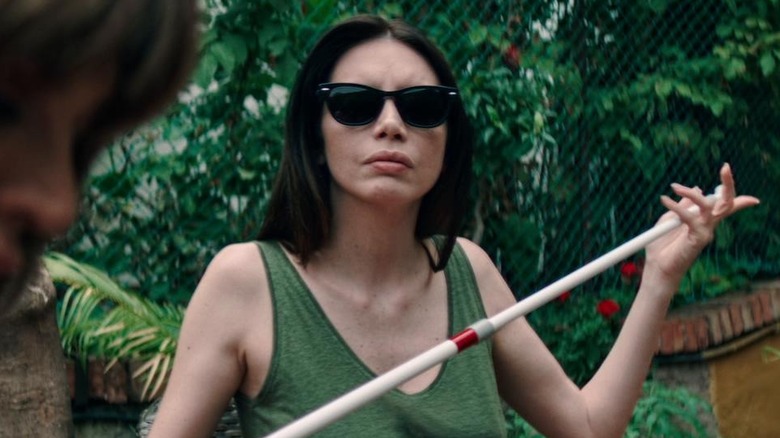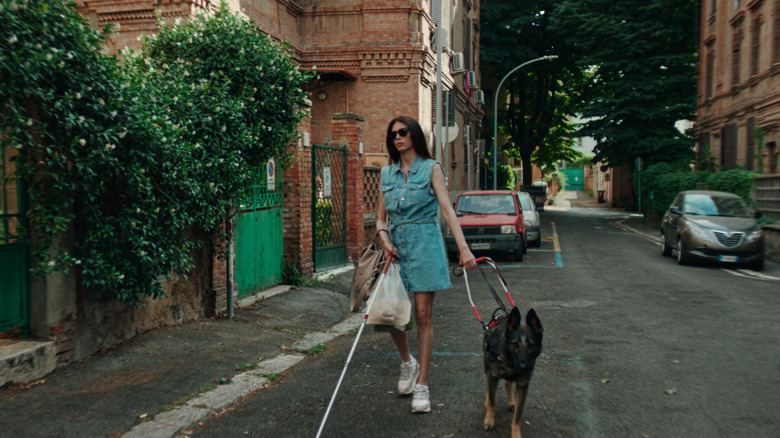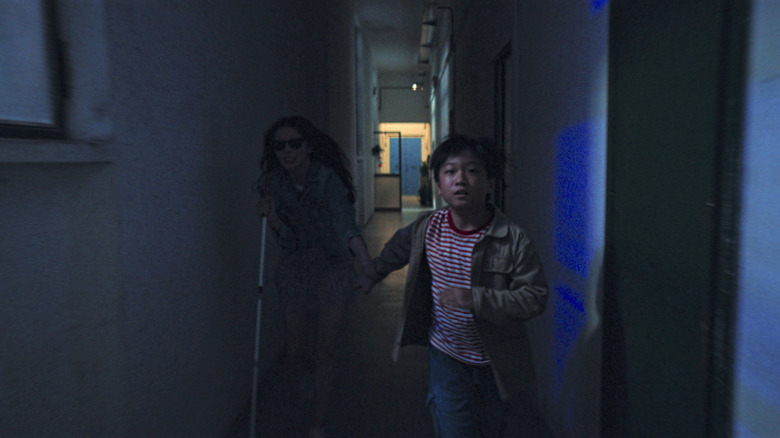Dark Glasses Review: Dario Argento Returns
- Leads with a great concept
- Dario Argento can still build tension well
- The third act really works
- Argento's signature death scenes are lacking
- Some of the more emotional moments don't quite land
There was a time when Italian cinema legend Dario Argento was the king of giallo films, arguably the best (and best-known) practitioner of the genre's tales of mysterious killers, women in peril, and elaborate death scenes full of hyper-stylized visuals. Then the filmmaker's output slowed, he turned to other horror subgenres, and it seemed for a while like Argento might never again return to the thriller form that made him famous.
Happily, this was not the case. With "Dark Glasses," his first feature film in a decade and his first giallo since 2009, Argento looks to recapture some of the magic that so defined his career in the 1970s and 1980s, directing and co-writing a new murder mystery with an intriguing thriller hook. In some ways, that news alone is enough to thrill many horror fans. Argento returning to his signature genre at the age of 82, after years away, is achievement enough in and of itself, and even a halfway competent film from the old master would please many viewers. Thankfully, "Dark Glasses" is more than just competent. While it can't match the scale or elaborate precision of his giallo heyday, Argento's return is a welcome reminder that he can still deliver the magic on a smaller scale, and that he still has a knack for finding just the right thriller notes to make us all squirm in our seats.
Total eclipse
In the wake of an eclipse that captivates a whole city, a killer strikes, brutally murdering a sex worker outside a swanky hotel where fellow sex worker Diana (Ilenia Pastorelli) also entertains her clients. When one client gets a little too demanding, she flees the hotel, only to find herself pursued by the same killer. After violently crashing her car while trying to get away, Diana wakes up in a hospital blinded by the accident, very aware that the killer might still be on her trail.
"Dark Glasses" devotes much of the narrative that follows to watching Diana adjust to her new normal, with the help of a counselor (Asia Argento) and a young boy named Chin (Xinyu Zhang) whose life was also shattered by the car crash. It's a surprisingly intimate piece of storytelling, particularly when compared to the more brutal, complex narratives of past films like "Deep Red" and "Tenebrae," but in this case Argento actually seems to better serve the material by tightening the focus. Like his classic film "Phenomena," Argento gets a lot of mileage out of the odd couple that is Diana and Chin, exploring their respective wounds and how each of them respond when danger comes calling. It's a dynamic that really works, and adds to the tension as Argento returns to the classic suspense scenarios that made him a star of genre cinema in the 1970s.
Small-scale Argento
If there's anything in particular that longtime Argento fans might find missing from "Dark Glasses," it's the horror legend's knack for lengthy, elaborate death sequences. There are deaths in the film, of course, and they do make an impact, but Argento has discarded many of his giallo signature this time around in favor of a more stripped-down story. That story works, and often works well, but it does sometimes feel that it's missing something, and it's hard not to wonder if a classic Argento set piece involving spraying blood and a gloved hand holding a knife might have filled that void. The film still works without it, of course, but Argento lovers might come away a little disappointed in this simplified form.
And yet, the simplified form still lands, particularly when Argento pours on the tension in scenarios that push Diana and Chin to their limits. If the giallo master has steered clear of elaborate kills this time around, he definitely hasn't avoided extended sequences of cat-and-mouse, as he steers his protagonists through increasingly complex and dangerous situations with ease and precision. The film works, and is usually at its best, when you realize that at the end of every survival scenario there's another, tougher survival scenario to endure, and all the gleeful energy that came in films like "Suspiria" and "The Bird with the Crystal Plumage" is on full display in these moments. It's here that Argento the old master returns, reminding us all why he was so often considered one of the key successors to Alfred Hitchcock in the realm of thriller cinema. The story is smaller, the characterization more intimate, and the violence a bit more restrained, but he's lost none of his knack for keeping us on the edge of our seats, even of some of his other cinematic gifts have waned through either the passage of time or his own design.
At the center of it all, Pastorelli and Zhang are asked to carry much of the film themselves, taking their unlikely chemistry in increasing nerve-testing directions with each new sequence, and they're both admirably game for the task. The simple contrast in their existence as characters is enough to draw the eye, but the soulful inner-workings of each performance keep us glued to the screen, and make Argento's long pursuit sequences work that much better.
"Dark Glasses" might not go down in history as an Argento classic to be placed alongside masterpieces like "Deep Red" and "Opera," but there's something instantly appealing and powerful about the film nonetheless. It's a film that recaptures something, a sense of energy that Argento perhaps never lost, but simply put aside for many years to focus on other things. Now, with this film and this story, we've reclaimed some of that old giallo magic from one of the genre's best practitioners, and that's very much worth celebrating.
"Dark Glasses" is in limited theaters on Friday, October 7, and streams on Shudder on Friday, October 14.


